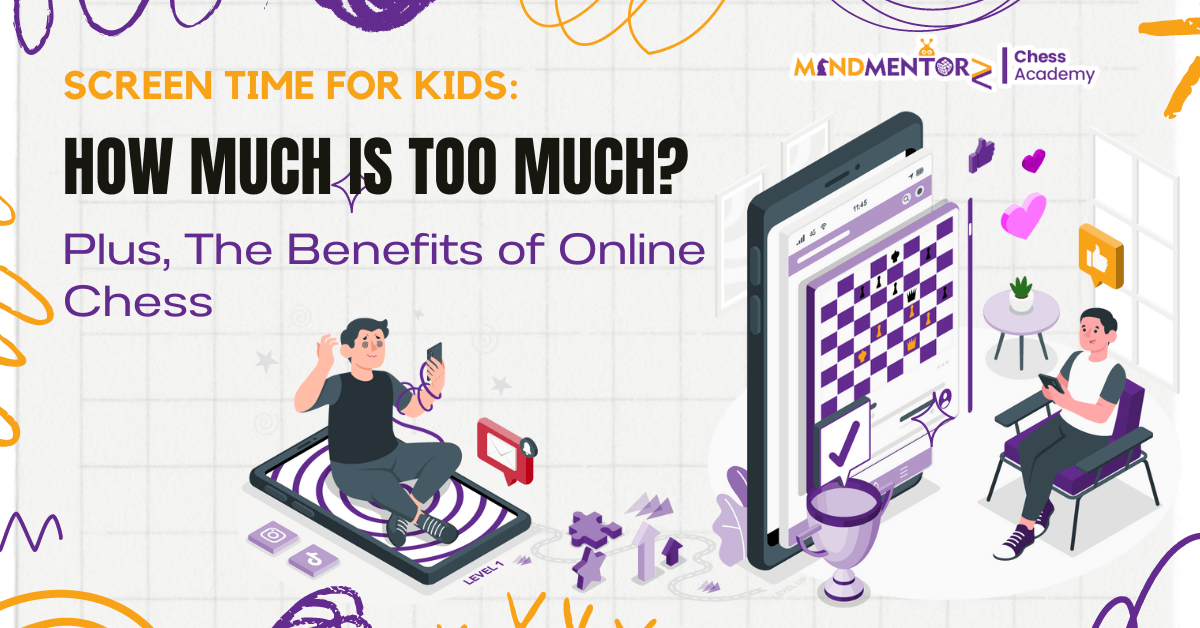
In today’s digital age, it’s common for children to spend significant time on screens. Whether it’s for online learning, entertainment, or social interactions, screens have become a crucial part of their daily lives. However, as parents, we often worry: how much screen time is too much? Moreover, with so many activities available online, it’s essential to understand which ones can be beneficial. One such activity is playing chess online. At MindMentorz Chess Academy, we believe that chess, especially online chess, is an excellent way for kids to use their screen time effectively.
Understanding Screen Time: How Much is Too Much?
The term “screen time” refers to the amount of time a person spends in front of a screen, including televisions, computers, smartphones, and tablets. According to experts, the amount of screen time children should have varies by age. The American Academy of Pediatrics suggests the following guidelines:
- For children aged 2 to 5 years: Limit screen time to one hour per day of high-quality educatonal progra
ms. - For children aged 6 years and older: Place consistent limits on the time spent using media, ensuring it doesn’t interfere with sleep, physical activity, and other healthy behaviors.
But let’s be honest, as Indian parents, these guidelines can feel quite challenging to implement. With online classes, educational apps, and even social connections moving online, screen time often exceeds these recommendations. The key, therefore, is to focus not just on the quantity of screen time, but also on the quality.
The Balance Between Screen Time and Real-Life Activities
It’s crucial for kids to balance their screen time with real-life activities. Too much screen time can lead to several issues, such as:
- Reduced Physical Activity: When children spend too much time on screens, they may become less physically active, leading to problems like obesity.
- Sleep Problems: Excessive screen time, especially before bed, can interfere with sleep patterns.
- Impact on Mental Health: Overuse of screens can lead to anxiety, depression, and other mental health issues due to social media pressures and the addictive nature of some games.
As a parent, the goal should be to ensure that your child engages in a variety of activities throughout the day. Encourage outdoor play, reading books, and spending quality family time. By doing so, screen time becomes one of many activities in your child’s daily routine, rather than the main focus.
Why Chess is a Great Online Activity for Kids
While it’s important to limit screen time, not all screen-based activities are created equal. Playing chess online, for instance, can be incredibly beneficial for children. Chess is known to develop critical thinking, improve concentration, and enhance problem-solving skills. At MindMentorz Chess Academy, we have witnessed firsthand how online chess has positively impacted our students.
Here’s why online chess is an excellent choice for children:
- Enhances Cognitive Skills: Chess requires children to think several steps ahead, which improves their planning and foresight abilities. It also helps in enhancing memory and cognitive skills.
- Improves Focus and Concentration helping Academic Performance: In chess, one wrong move can cost the game. This teaches kids to focus and concentrate on their tasks, a skill that is transferable to their studies and other activities.
- Encourages Patience and Discipline: Chess teaches kids to be patient, to think before they act, and to learn from their mistakes. These qualities are invaluable in both academic and personal growth.
- Develops Problem-Solving Abilities: Chess is essentially a game of problem-solving. Kids learn to anticipate their opponent’s moves and devise strategies to counter them, which enhances their analytical and critical thinking skills.
- Promotes Healthy Competition: Playing chess online allows children to compete against peers from around the world, fostering a sense of healthy competition and sportsmanship.
How to Incorporate Online Chess into Your Child’s Routine
Incorporating online chess into your child’s daily routine can be a wonderful way to make screen time more productive. Here’s how you can do it:
- Join an Online Chess Academy: Institutions
like MindMentorz Chess Academy offer a structured and supportive environment where children can learn and play chess with others. Being part of an online chess community can make the experience more enjoyable and motivating. - Set a Regular Chess Time: Designate a specific time during the day for your child to play chess online. This could be after homework is done or during a weekend break.
- Monitor Progress: MindMentorz keeps track of your child’s progress in chess, and provides regular feedbacks. Celebrate their wins and guide them learn from their losses. This will keep them engaged and help them develop a growth mindset.
- Balance with Other Activities: Ensure that chess is part of a balanced routine. Encourage physical activities and social interactions to ensure overall well-being.
To Sum Up: Quality Matters in Screen Time
As parents, it’s essential to shift our focus from merely counting the hours our children spend on screens to considering the quality of that time. Not all screen time is harmful, and some activities, like online chess, can be highly beneficial for a child’s development. By incorporating such activities into their daily routine, you can ensure that your child’s screen time is not only fun but also enriching.
At MindMentorz Chess Academy, we are committed to making chess accessible and enjoyable for children. We believe that with the right guidance, screen time can be transformed from a potential concern into a valuable educational experience. So, the next time your child asks for screen time, encourage them to play a game of chess online—it might just be the best move they make.
